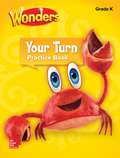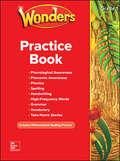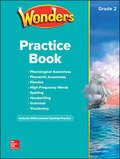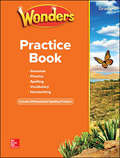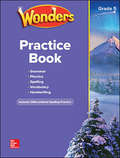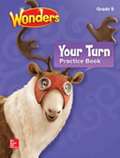- Table View
- List View
Wonders, Practice Book, Grade 1
by McGraw-Hill EducationNIMAC-sourced textbook <P><P>Blackline masters that provide multiple opportunities for students to master skills and strategies. The Practice Book features phonological awareness, phonemic awareness, phonics, spelling, handwriting, high-frequency words, category words, and grammar practice for each week of instruction, plus take-home stories.
Wonders, Practice Book, Grade 2
by McGraw-Hill EducationNIMAC-sourced textbook <P><P>Blackline masters that provide multiple opportunities for students to master skills and strategies. The Practice Book features phonological awareness, phonemic awareness, phonics, spelling, handwriting, high-frequency words, category words, and grammar practice for each week of instruction, plus take-home stories.
Wonders, Practice Book, Grade 3
by McGraw-Hill EducationNIMAC-sourced textbook <P><P>Blackline masters that provide multiple opportunities for students to master skills and strategies. The Practice Book features phonological awareness, phonemic awareness, phonics, spelling, handwriting, high-frequency words, category words, and grammar practice for each week of instruction, plus take-home stories.
Wonders, Practice Book, Grade 5
by McGraw-Hill EducationNIMAC-sourced textbook <P><P>Blackline masters that provide multiple opportunities for students to master skills and strategies. The Practice Book features phonological awareness, phonemic awareness, phonics, spelling, handwriting, high-frequency words, category words, and grammar practice for each week of instruction, plus take-home stories.
Wonders, Reading/Writing Companion (Elementary Core Reading #Unit 1)
by McGraw HillNIMAC-sourced textbook
Wonders, Reading/Writing Companion (Elementary Core Reading #Unit 10)
by McGraw HillNIMAC-sourced textbook
Wonders, Reading/Writing Companion (Elementary Core Reading #Unit 6)
by McGraw HillNIMAC-sourced textbook
Wonders, Reading/Writing Companion (Elementary Core Reading #Unit 8)
by McGraw HillNIMAC-sourced textbook
Wonders, Reading/Writing Workshop, Florida Edition
by McGraw Hill*This textbook has been transcribed in UEB, formatted according to Braille textbook formats, proofread and corrected. <P><P>
Wonders, Weekly Assessments, Grade 5 (Elementary Core Reading)
by McGraw HillNIMAC-sourced textbook
Wonders, Your Turn Practice Book, Grade 5 (Elementary Core Reading Series)
by Donald Bear McGraw HillProvides students with their first guided practice, with fresh reading selections every week. Students can underline, circle, and highlight text to support answers with text evidence.
Wonders, [Grade 1, Unit 1], Reading/Writing Workshop
by Donald R. Bear Janice A. Dole Diane AugustNIMAC-sourced textbook

